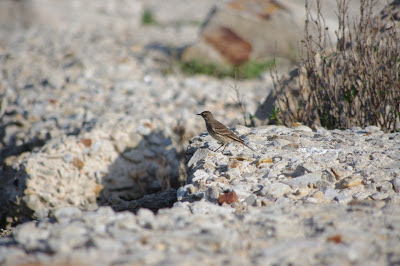We've had some really pleasant weather this winter along the gulf coast of Texas. Its nice to be able to go to the beach for a walk while there are few tourist and not many crowds or traffic. There are many resident birds here on Galveston Island and also quite a few winter visitors.
Roseate Spoonbills - Platalea ajaja, in Galveston Island State Park
Mottled Ducks - Anas fulvigula maculosa, can be see year round on Galveston Island. Many other waterfowl winter here such as: Mallard, Pintail, Northern Shovelers, Blue & Green-winged Teal, Lesser Scaup, Ruddy Ducks, and Red-breasted Merganser.
Neotropic Cormorants - Phalacrocorax brasilianus.
Similar to Double-crested Cormorants but have a longer tail and smaller size. They also have that V-shaped border on their chin patch clearly seen on the bird in the middle of the picture.
Double-crested Cormorant - Phalacrocorax auritus
You can see its short tail but also in real life it looks larger and huskier than the Neotropic.
Snowy Egret - Egretta thula
Forster's Tern - Sterna forsteri
Royal Tern - Thalasseus maximus
A unfortunate sight... And sadly there were a few other dead birds along the beach: Laughing Gulls, Ring-billed Gull, & Brown Pelican; that I could identify. With all the runoff from Houston and surrounding cities there was an abundance of visible pollution as well as lots of fishing line and other gear discarded on the beach.
Great-tailed Grackle - Quiscalus mexicanus
Great Blue Heron - Ardea herodias
Ruddy Turnstone - Arenaria interpres
One of the few shorebirds I have seen lately. On previous trips this same spot had many other species present including the endangered Piping Plover.
Savannah Sparrow - Passerculus sandwichensis
Quite a few here birds in the grassy areas along the shore. These are winter visitors.
American Pipit - Anthus rubescens
Another winter visitor.
Glaucous Gull - Larus hyperboreus
A rare bird from the north. Common around Alaska. This gull stuck out like a sore thumb with pale plumage and its huge size among the already large Herring Gulls. It's interesting that it found its was all the way down here.





































